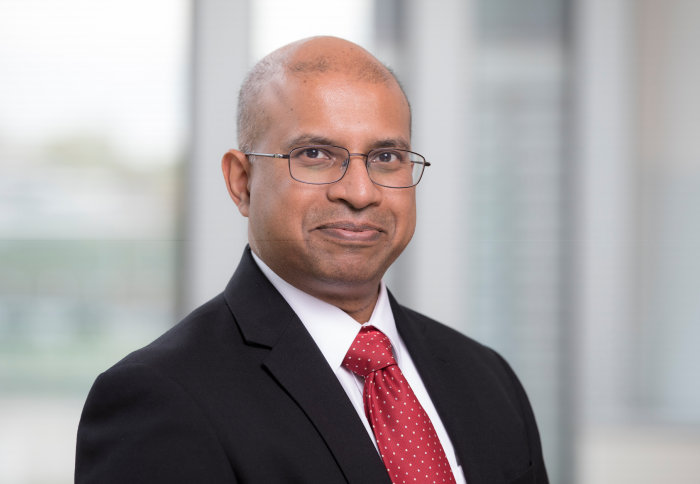Meet Professor Darrel Francis: new Head of Section with NHLI

Professor Darrel Francis has taken over from Professor Peter Sever as the head of the Cardiovascular Trials and Epidemiology Section in NHLI.
Professor Darrel Francis joined Imperial for his thesis which developed mathematical techniques to analyse phenomena in cardiac dynamics and cardiorespiratory interaction, where purely qualitative approaches may be misleading or confusing. Darrel is now Professor of Cardiology at the NHLI specialising in applying quantitative techniques, derived from mathematics, engineering and statistics, to problems that affect patients with heart disease.
"I now consider my motivation to be to work with the kindest, brightest, most hardworking young cardiologists to deliver bias-free answers as precisely as possible on questions that matter to patient-care. There is no better place than NHLI to do this" Professor Darrel Francis
Professor Francis takes over the reins from Professor Peter Sever who has been a section head with NHLI for 15 years. Professor Sever commented “It has been an enormous privilege to work alongside such a talented group of clinicians and scientists, and I have great hopes for the future of the section”. Looking ahead to Darrel’s leadership Peter stated “I am delighted to hand over the section lead to Darrel, whose unbridled enthusiasm, talent and aspirations will, without doubt, take us to a new level of achievement in these highly competitive times”.
I caught up with Professor Darrel Francis to find out more about him and his plans for the future at NHLI.
What is your research about?
Knowing more accurately and truthfully how good and accurate our tests and treatments are and developing genuinely better ones if possible.
What is your most exciting project at the moment?
We are partnering with 25 hospitals around the country to develop a cardiology-led artificial intelligence system to increase the efficiency, consistency and accuracy of echocardiographic assessments of the heart.
What is on the horizon for the Cardiovascular Trials and Epidemiology Section?
We all want medicine to be “personalised”. I believe that in the next few decades, we will realise that this entails far more than looking for a few gene polymorphisms in patients to try to put them into subgroups. This can work brilliantly well to characterise cancer tissue, but is almost futile for the common cardiovascular diseases, since they are overwhelmingly driven by large numbers of small genetic effects and small numbers of large environmental effects arising principally from behaviour.
I hope we as a medical community, will realise that if we want to personalise treatment to those who would benefit the most, we need to become good at detecting benefit precisely. At the moment we can only detect average improvements in large groups of people, which means we can tell virtually nothing about individualised susceptibility to benefit or harm.
First we need formal recognition that precision of characterisation of disease status is a specialised science with specific methodology and standards of success. Then we require the willingness to use far more sophisticated approaches to synthesizing clinical information. I believe future generations will be using sophisticated models which can incorporate continuous variables and having the numerical skills to interpret this for patients.
Finally, I hope that we will be willing to share with patients a far more sophisticated understanding of clinical uncertainty and of the origin of valid knowledge of best medical practice. I hope patients will understand why information from unbiased research, e.g. blinded-randomised trials where symptoms are assessed, is the most reliable. I hope that patients will seek out guidance based on such data and where it is not available, offer to contribute to it through participation in high-quality research.
Why did you become a scientist?
Now that I am a Professor, I can at last admit that throughout my clinical studies and years as a House Officer and SHO I wasn’t sure what I wanted to do, except that I didn't want to do research. At the time, I saw research as a sterile activity of making microscopic adjustments to knowledge on questions that nobody cared about, other than the researcher. I eventually went on to study a thesis in cardiology because there was only one NTN (national training number) in cardiology in London for two years and I was one of the many unlucky contenders.
By enormous good fortune, I did my research with Professor Andrew Coats at the NHLI and through the accident of my familiarity with computer software and mathematics, I was helpful to many people and learned about many aspects of cardiology research. I was bitten by the research bug in that time and have never really recovered!
I now consider my motivation to be to work with the kindest, brightest, most hardworking young cardiologists to deliver bias-free answers as precisely as possible on questions that matter to patient-care. There is no better place than NHLI to do this.
What inspires you?
When I find a Research Fellow doing something pointless and uninteresting, and I draw myself to my full 166cm and lambast them, demanding they desist immediately and do something better...and then later have to eat my words and beg to get my name on to the paper, which has now been accepted in a top journal.
Find out more about the research by the Cardiovascular Trials and Epidemiology Section at NHLI
Article text (excluding photos or graphics) © Imperial College London.
Photos and graphics subject to third party copyright used with permission or © Imperial College London.
Reporter
Ms Helen Johnson
Communications Division